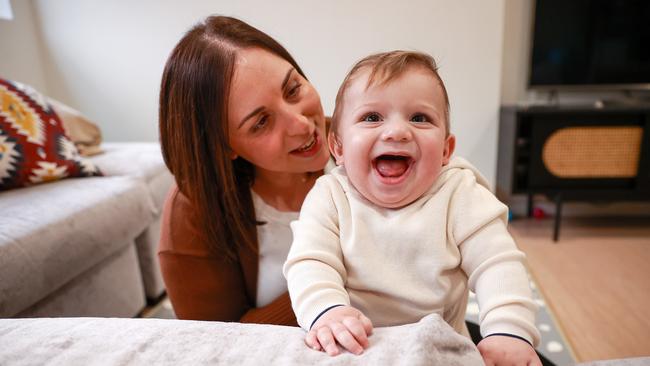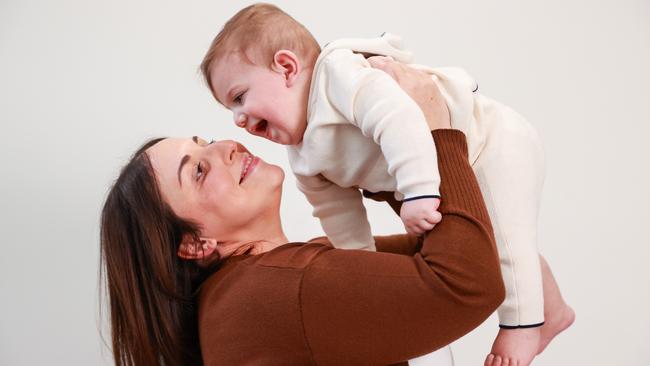Superfast new way for infertile women to get pregnant with IVF
Weeks of hated hormone injections are no longer necessary for some infertile women thanks to an Aussie breakthrough in IVF treatment.
National
Don't miss out on the headlines from National. Followed categories will be added to My News.
A breakthrough Australian fertility treatment has slashed the number of hormone injections a woman needs and dramatically sped up the process of making a baby.
Instead of the 12-14 days of hormone injections used in conventional IVF, the new treatment involves just two days of hormone jabs.
The In Vitro Maturation (IVM) treatment being offered at the Royal Hospital for Women in Sydney has also cut medicine costs to taxpayers by 90 per cent from $4000 to $400.
“The patient could in theory come and see me on Monday, we can do the injection Tuesday, Wednesday and do the egg collection on Thursday. It’s over in no time,” said Head of Obstetrics at the hospital Professor Bill Ledger.
The new fertility treatment called CAPA-IVM was developed by University of NSW Professor Rob Gilchrist and colleagues in Brussels and The Royal Hospital for Women has become only the 5th location in the world to offer it.
Using the treatment, doctors are able to collect much tinier 4-5 millimetre eggs from women and they are matured slowly in a laboratory in a special CAPA fluid that slows down the process from 24 hours to 48 hours.
In conventional IVF the eggs have to mature inside a woman until they are around 18 or 20 millimetres hence need for more injections.
A large study in Vietnam showed the chance of a woman having a baby using IVM was the same as when they used conventional IVF, Professor Ledger said.

The superfast process will also be a huge step forward for women who need to freeze their eggs before cancer treatments.
If their cancer is fast growing they often don’t have time to complete conventional fertility treatment before they start chemotherapy but it’s much more feasible when only two hormone injections are needed, Professor Ledger said.
“It a game changer because it’s moved the IVF pregnancy rate from pretty poor to equivalent to IVF for this younger group,” he said.
The treatment is not being offered to all women but only those aged under 36 who have a good egg reserve and good levels of the AMH hormone.
“The majority of women will still have to do IVF,” he said.
The hospital has so far used the treatment on two young women with cancer who now have frozen embryos.
“We don’t have a pregnancy yet because obviously that group have to have the chemo and wait five years,” he said.
Starting this week the hospital expects to offer the treatment to up to 60 women this year and around a third of all patients will receive it in the future.
Professor Ledger said the treatment would be good for women who had a needle phobia.
It also involved fewer hormonal side effects such as bloating, nausea and headaches and meant women had less stress and fewer interruptions at work, he said.
“Everybody hates the hormone injections,” he said.

Sydney mum Rachell Kleiner knows just how important medical research into new fertility treatments can be.
Her 10 month old baby Gray was conceived using a revolutionary ovarian tissue transplant.
In 2005, when Ms Kleiner was diagnosed with an aggressive cancer at age 21 fertility treatment had not evolved to the point where she could freeze her eggs before her chemotherapy.
Instead, doctors took a slice of her ovarian tissue and froze it.
Thirteen years later, she became the first person in NSW to use the tissue to get pregnant.
“We grafted back in four pieces into my right ovary, and four pieces of tissue into my abdominal wall, and then waited for that tissue to come back to life,” the now 37-year-old said.
The public launch of the IVM treatment coincides with the Royal Hospital for Women Foundation’s ‘Heart for Her’ fundraising appeal which is aiming to raise much-needed funds for more research and equipment.
The new CAPA-IVM treatment would not have been possible without public donations to the Hospital’s Fertility and Medical Research Centre.





